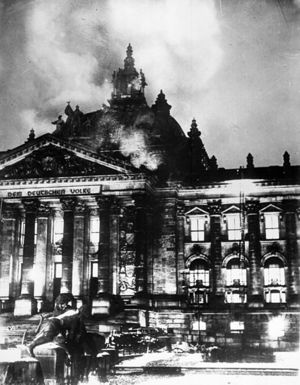Reichstag Fire
 | |
| Date | 27 February 1933 |
|---|---|
| Location | Reichstag building, Berlin, Germany |
| Blamed on | Marinus van der Lubbe |
| Interest of | Marinus van der Lubbe |
| Description | Generally reckoned at the time to be a false flag attack, Hitler quickly seized upon the fire at the Reichstag to pass an "enabling act", ushering in full on totalitarian rule. In retrospect it may indeed have been the work of an isolated individual. |
The Reichstag Fire of 1933 burned down the German parliament, the Reichstag. It was blamed on a communist sympathiser, Marinus van der Lubbe, who was executed for the crime. At the trial he stated "I set the fire. None of these other defendants had anything to do with it."[1]
Contents
Official narrative
| The Reichstag Fire - The Pacifist |
This was claimed by the Nazi party to have been the work of a communist "lone nut", although this was widely disbelieved both in and outside of Germany.[1]
Dissent
Seftan Delmer, a British journalist doubted the Nazi official narrative, writing that "The arson of the German parliament building was allegedly the work of a Communist-sympathizing Dutchman, van der Lubbe. More probably, the fire was started by the Nazis, who used the incident as a pretext to outlaw political opposition and impose dictatorship... The fire broke out at 9.45 tonight in the Assembly Hall of the Reichstag. It had been laid in five different comers and there is no doubt whatever that it was the handiwork of incendiaries."[1]
German Jew Victor Klemperer wrote in his diary: "Eight days before the election the clumsy business of the Reichstag fire - cannot imagine that anyone really believes in Communist perpetrators instead of paid Nazi work. Then the wild prohibitions and acts of violence. And on top of that the never-ending propaganda in the street, on the radio etc."[1]
Background
On 31st January, 1933, Joseph Goebbels wrote in his diary: "During discussions with the Führer we drew up the plans of battle against the red terror. For the time being, we decided against any direct counter-measures. The Bolshevik rebellion must first of all flare up; only then shall we hit back."[1]
Aftermath
The day after the fire Adolf Hitler, Chancellor of Germany, asked for and received from President Hindenburg the Reichstag Fire Decree, signed into law by Hindenburg using Article 48 of the Weimar Constitution. The Reichstag Fire Decree declared a state of emergency, suspending most civil liberties in Germany, including habeas corpus, freedom of speech, freedom of the press, the right of free association and public assembly, the secrecy of the post and telephone - rights were not reinstated during Nazi reign.[2]
Trial
The Dutchman Marinus van der Lubbe was tried with 4 other men, Ernst Torgler, Georgi Dimitrov, Blagoi Popov and Vassili Tanev. Van der Lubbe denied that there was a conspiracy. On 23rd December, 1933, Judge Wilhelm Bürger pronounced van der Lubbe guilty of "arson and with attempting to overthrow the government", and the other men were found not guilty.[3] On 10th January, 1934, Wilhelm Bürger beheaded Marinus van der Lubbe.<ref name=sp>
The Official Culprit
| Name | Description |
|---|---|
| Marinus van der Lubbe | Blamed for the Reichstag Fire |
References
- ↑ Jump up to: a b c d e http://spartacus-educational.com/GERreichstagF.htm
- ↑ Claudia Koonz (2003). The Nazi Conscience. p. 33. ISBN 0-674-01172-4.
- ↑ Cite error: Invalid
<ref>tag; no text was provided for refs namedspartacus